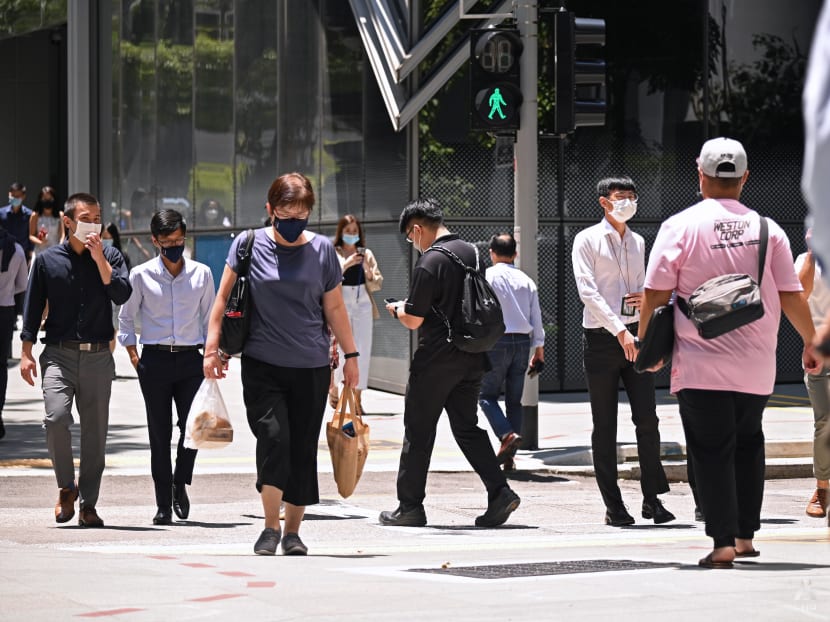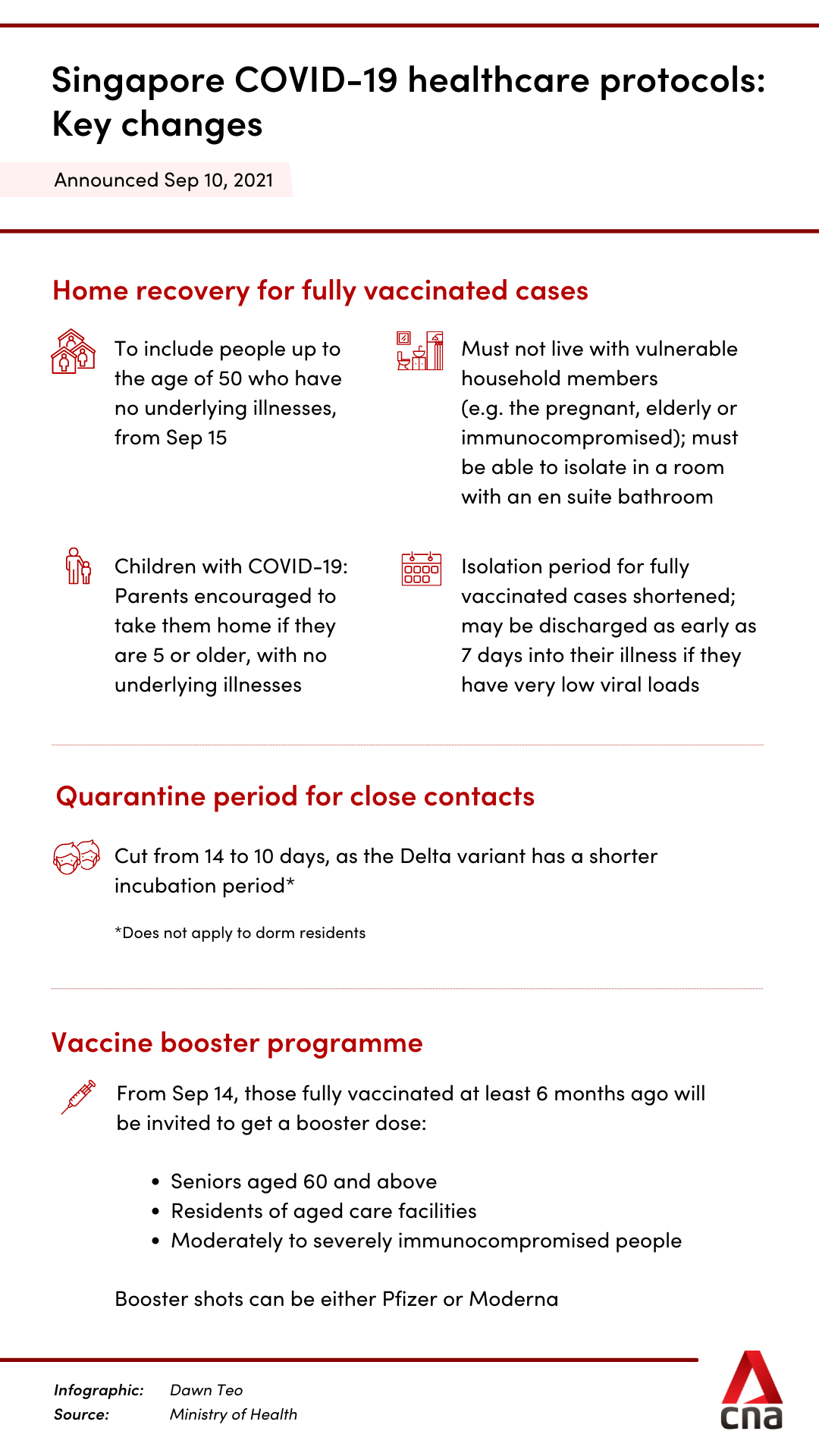Sharp spike in Singapore's COVID-19 cases ‘worrying’, next 2 to 4 weeks will be crucial: Gan Kim Yong
Daily COVID-19 cases in Singapore will reach 1,000 very soon, says co-chair Lawrence Wong.

Office workers cross a road in the financial district of Raffles Place on Sep 6, 2021. (Photo: CNA/Gaya Chandramohan)
SINGAPORE: While the rise in COVID-19 cases is expected as Singapore opens up, the sharp rate of increase is "worrying", said co-chair of the multi-ministry task force Gan Kim Yong on Friday (Sep 10).
The number of daily cases has doubled since last week, with 450 new infections reported on Thursday, he noted.
“While we expected an increase in the number of cases every day when we open up, the sharp rate of increase is worrying,” said Mr Gan at a press conference.
“Although our vaccination rate has now surpassed that of many countries and is one of the highest in the world, we want to be sure that the number of cases will not suddenly spike, which can lead to more serious cases, and which will, in turn, overwhelm our healthcare system.”
This is the first time Singapore is experiencing an “exponentially rising” wave of infection in the community, said the Ministry of Health (MOH) in a media release.
"All countries that have opened up have had to deal with such waves. For us, it's happening faster than we had expected," said co-chair of the task force Lawrence Wong at the press conference.
“Very soon, we will reach 1,000 cases a day. And in a few weeks' time, we will probably get to 2,000 new cases a day.
“And that’s why we have to take a more cautious approach in the current situation and make sure that we adjust quickly to this fluid and rapidly changing infection situation."
Countries like Israel and the United Kingdom have seen a sharp spike in cases after easing their COVID-19 measures, despite high vaccination coverage, Mr Gan noted.
“Therefore we want to be cautious and give ourselves more time to be certain that a high number of daily cases will not result in a high number of serious cases or deaths," he said.
"The next two to four weeks is therefore crucial, as we will find out if patients eventually develop serious illnesses and complications subsequently.”
As of Thursday, 664 COVID-19 patients are warded in hospitals, of which 26 are cases of serious illness who require oxygen support in the general ward. Another seven are in critical condition in the ICU, said MOH’s director for medical services Associate Professor Kenneth Mak.
“We understand that the rapid increase in infection numbers have created some concern and anxiety among our people,” said Mr Gan, noting the measures announced earlier this week are aimed at slowing down the spike in cases.
“Since then, there have also been questions about whether the Government is going back on our plan to reopen despite our high vaccination rates,” he added.
“While I understand that many would prefer a straighter road to COVID-19 resilience, we have said before that we must expect some twists and turns along the way, given the unpredictability of the virus. So we need to be prepared to adjust our plans as we go along.”
Health Minister Ong Ye Kung said Singapore is sticking to its course for now on a transition towards endemic living.
"As far as possible, we don’t want to reverse course in our transition plan," said Mr Ong.
"We need to monitor the incidences of severe illnesses and deaths closely, in the coming two, three, four weeks. So let us navigate this wave first before we embark on further steps to reopen. For now, we are not reversing, we still want to progress on our transitioning journey. But we’re not racing ahead, we are actively responding, watching and monitoring.”
UPDATES TO HEALTHCARE PROTOCOLS, BOOSTER JABS
The “most immediate task” is to reconfigure healthcare protocols so that Singapore can cope with the current level of infections, said MOH in its media release.
This includes stepping up testing, as previously announced.
“This is especially important to avoid spikes in the number of cases," said Mr Gan. "This is also important for businesses as infections that are caught early are less likely to see large clusters, which will, in turn, create severe disruptions to business operations."
Related:
Booster jabs were announced for seniors aged 60 and above and residents of aged-care facilities who have completed their vaccination regimen at least six months ago.
The ministers also stressed the importance of vaccination, saying there is "strong evidence" that this protects people against serious illness.
Among the infected cases, the percentage of those unvaccinated who became severely ill or died was 5.2 per cent, while that of those who were fully vaccinated was 0.8 per cent, said Assoc Prof Mak.
“This means that if you are still not fully vaccinated against the COVID-19 virus, you will have … 6.5 times a higher likelihood of getting a severe infection or a bad outcome, compared to a fully vaccinated person,” he added.
Commenting on the rise in COVID-19 cases, Assoc Prof Mak said the doubling of new infections every week reflects an ongoing community spread that has taken place as Phase 2 (Heightened Alert) measures were relaxed.
With more social interactions taking place, MOH has found COVID-19 transmissions at the workplace, social and household settings, contributing to large clusters like the ones at Bugis Junction and bus interchanges.
“These transmissions may have been facilitated by the increase in mask-off, close physical interactions occurring between individuals and amongst groups of people,” said Assoc Prof Mak.
“There were also breaches in safe management measures and poor compliance in mask-wearing requirements in some of these cases, that possibly further contributed to the spread.”
DELTA VARIANT
The Delta variant is currently the dominant strain causing infection in the community, Assoc Prof Mak said, as found in phylogenetic testing of cases.
“This is driving the present, rapid rise in infections," he said, noting that Delta is “highly infectious and transmissible” compared to other variants encountered in the last 20 months.
“We’ve seen a number of super spreading events arise this year related just to the Delta variant, with multiple generations of spread amongst different geographic settings,” he said, adding that this includes the Jurong Fishery Port cluster.
The National Centre for Infectious Diseases (NCID) has also found that people infected with the Delta variant may have high viral loads at an early phase of their infections, said Assoc Prof Mak.
“And this is particularly for unvaccinated but infected cases, and they have more prolonged shedding of the virus, compared to the other variants. This does contribute to the overall increased transmissibility seen with this variant.”
Responding to a question about whether the task force is confident that the public will voluntarily change their behaviour to reduce the spread of the virus despite some COVID-19 fatigue, Mr Wong said that authorities understand that there is fatigue, but people are concerned about their health and safety.
“And that’s why we are not making a return to the heightened alert, because there is tremendous fatigue … Our focus is not the daily numbers, but we’re looking at the hospital system and therefore with a high vaccination rate, there is no need to go back at this time to a heightened alert,” he added.
Mr Wong urged Singaporeans to cooperate and comply with safe management measures and start a new habit of regular, pervasive testing.
“It’s really in the interest in all of us to do that,” he said.
For example, companies that get their employees tested regularly can reduce their chances of the business being shut down because of a COVID-19 cluster, and individuals who test themselves regularly will know if they are asymptomatic carriers before visiting loved ones, said Mr Wong.
The multi-ministry task force does not take the support of Singaporeans “for granted”, said Mr Gan.
“We are very appreciative that we have been able to come so far because of the trust between the people and the Government and because of the support that people have for our various measures,” he added.
“Some of the measures can be very difficult and challenging, but they comply with them. We fully understand that sometimes the frustration that we are not able to open up as fast as we would like to.”
BOOKMARK THIS: Our comprehensive coverage of the COVID-19 pandemic and its developments
Download our app or subscribe to our Telegram channel for the latest updates on the coronavirus pandemic: https://cna.asia/telegram











